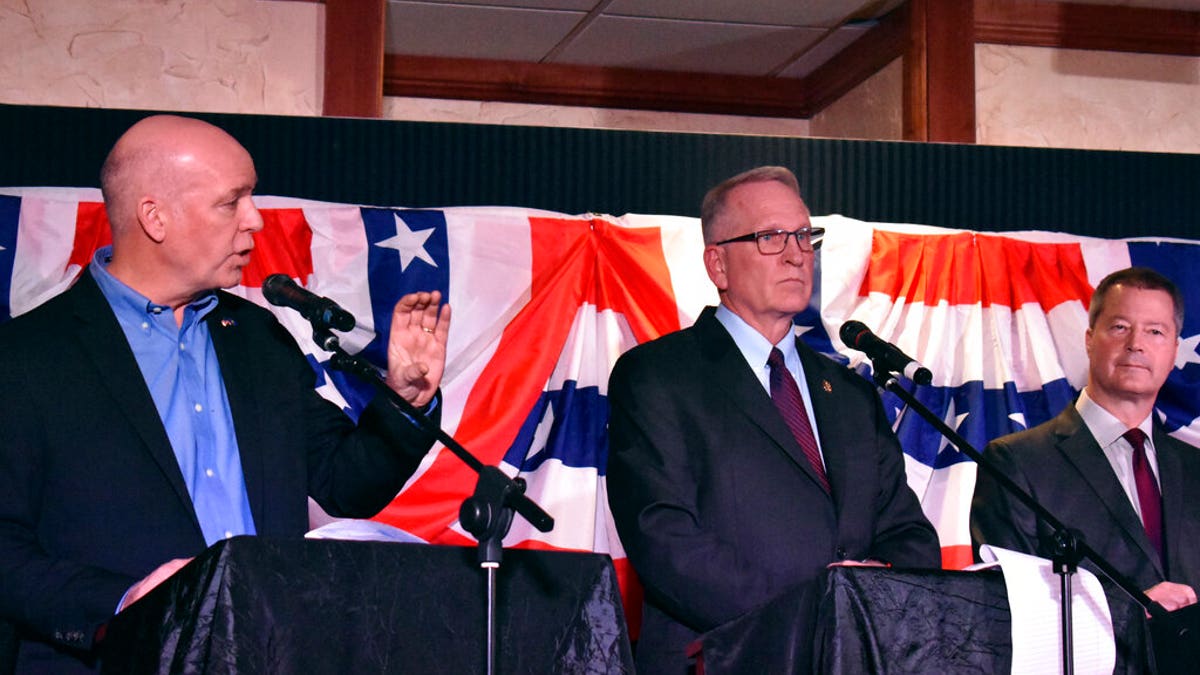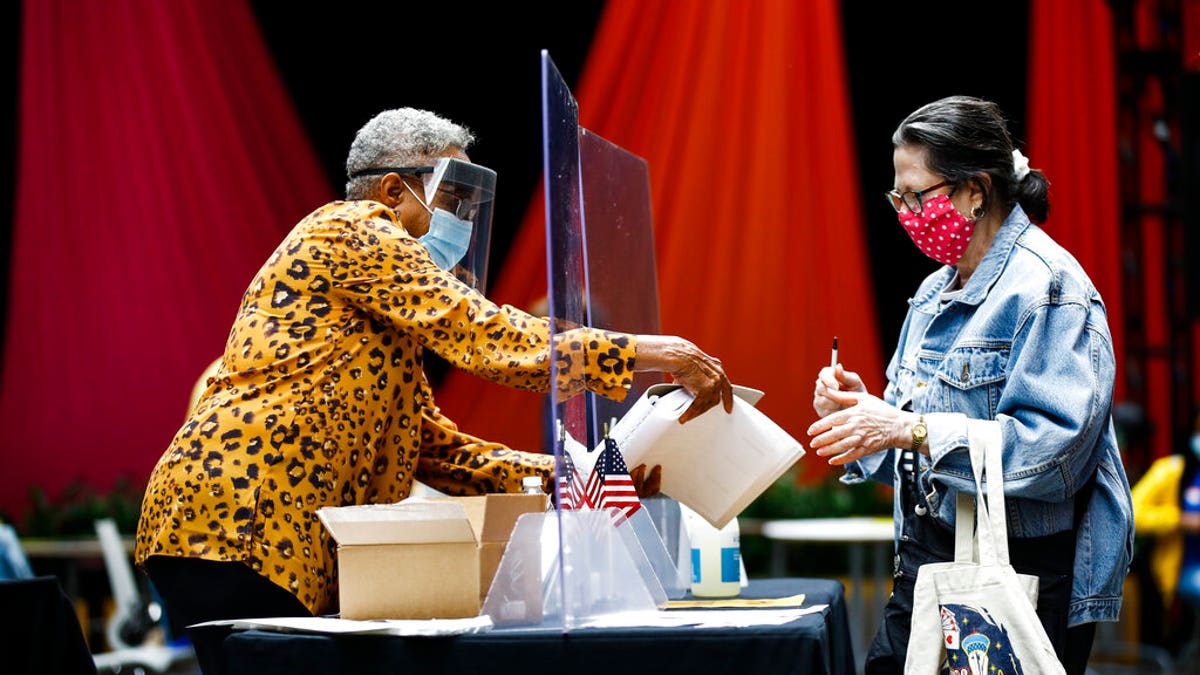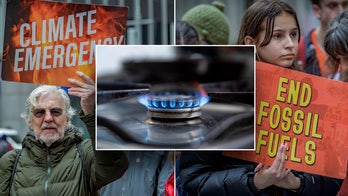Biden slams Trump's handling of protests, says he needs to actually read bible and US Constitution
Former vice president and 2020 Democratic presidential candidate Joe Biden delivers remarks on nationwide protests.
Greg Gianforte, the Montana Republican lawmaker who bodyslammed a reporter the day before his election to the House of Representatives in 2017, won the state's gubernatorial GOP primary on Tuesday.
President Trump, who along with Joe Biden also easily won several primary contests on Tuesday, previously praised Gianforte's pummeling of Guardian reporter Ben Jacobs. Gianforte is a strong ally to Trump.
"I shouldn't say this -- it's nothing to be embarrassed about," Trump began at an October 2018 rally. "I was in Rome with a lot of the leaders of other countries ... and I heard about it, and we endorsed Greg very early, but I had heard that he had body slammed a reporter. And he was way up, and I said, and this was the day of the election or just before -- 'This is terrible, he's going to lose the election.' And then I said, 'Wait a minute, I know Montana pretty well. I think it might help him.' And it did. He's a great guy. Tough cookie."
Gianfote pleaded guilty to misdemeanor assault in the incident, and was sentenced to community service and anger management lessons. He was also fined $385.
The incident was captured on audio tape. Initially, Gianforte said the reporter initiated the fight, but the politician recanted hours after Fox News reporter Alicia Acuna, who witnessed the incident, described what she saw.
Gianforte had previously run for governor in 2016, losing to incumbent Gov. Steve Bullock. This year, Bullock is running for Senate against GOP Sen. Steve Daines, who was also nominated on Tuesday. Daines has highlighted his focus on Montanans amid the coronavirus pandemic, including his efforts to evacuate residents trapped abroad.
Mike Cooney, Bullock's running mate against Gianforte in 2016, will be Gianforte's opponent.
“We ran against Mr. Gianforte in 2016. We know what he’s going to do," Cooney told a local news outlet. "He’s going to try to buy this thing and I don’t think Montanans are going to put up with that. I think they want to keep control of their elections. They want somebody with the leadership and experience, who can hit the ground running from day one, and that’s exactly what we’re prepared to do.”
In New Mexico, progressive candidate defeated ex-CIA officer Valerie Plame early Wednesday in the primary for the Third Congressional District. Plame, the former intelligence operative who rose to prominence when her identity was outed during President George W. Bush's administration, showed off what she called her CIA-taught driving skills in a splashy launch video for her campaign last year.
"Yes, the CIA really does teach us how to drive like this," Plame, a Democrat, claims in the video, after driving a Camaro muscle car in reverse for several seconds before executing a sharp turn on a dirt road, exiting the car, and strutting confidently towards the camera.
Separately in Tuesday's slate of primaries, state Sen. Randy Feenstra declared victory over embattled Iowa GOP Rep. Steve King in the 4th Congressional District. Feenstra had hammered King as an ineffective ally to President Trump, after top Republicans stripped of his committee assignments for asking during an interview: "White nationalist, white supremacist, Western civilization — how did that language become offensive? Why did I sit in classes teaching me about the merits of our history and our civilization?”
King also told Newsmax in 2013 that “for every one who’s a valedictorian, there’s another 100 out there that weigh 130 pounds and they’ve got calves the size of cantaloupes because they’re hauling 75 pounds of marijuana across the desert," referring to some immigrants.
The comments drew sharp rebukes from both parties.
Bide, meanwhile, is on the cusp of formally securing the Democratic presidential nomination after winning hundreds more delegates in primary contests Tuesday that tested the nation's ability to run elections while balancing a pandemic and sweeping social unrest. Biden could lock down the nomination within the next week as West Virginia and Georgia hold primaries.
GREG GIANFORTE: FOX NEWS TEAM WITNESSES GOP HOUSE CANDIDATE 'BODY SLAM' REPORTER
On Tuesday, voters across America were forced to navigate curfews, health concerns and National Guard troops — waiting in line hours after polls closed in some cases — after election officials dramatically reduced the number of in-person voting sites to minimize the spread of the coronavirus outbreak.
Biden and Trump easily swept their respective primary contests that ranged from Maryland to Montana and featured the night’s biggest prize: Pennsylvania. The two men are certain to face each other on the presidential ballot in November, yet party rules require them first to accumulate a majority of delegates in the monthslong state-by-state primary season.

FILE - In this Jan. 23, 2020, file photo, U.S. Rep. Greg Gianforte, left, speaks during a Republican gubernatorial primary debate as Attorney General Tim Fox, center, and state Sen. Al Olszewski listen in Billings, Mont. Republicans are seeking to end 16 consecutive years with a Democrat in the governor's office when current Gov. Steve Bullock completes his second term. The winner of the Republican gubernatorial primary will take on the winner of the Democratic race between Lt. Gov. Mike Cooney and first-time candidate Whitney Williams. (AP Photo/Matthew Brown, File)
Trump secured the Republican presidential nomination in March.
Pennsylvania, which offered Tuesday's largest trove of delegates, also represented a significant test case for Republicans and Democrats working to strengthen their operations in a premier general election battleground.
Voters were forced to brave long lines in “militarized zones” because officials consolidated the vast majority of polling places in Philadelphia to minimize health risks, according to Erin Kramer, executive director of One Pennsylvania.
Biden was in Philadelphia earlier Tuesday to deliver remarks about the civil unrest that has erupted across the nation after the police killing of George Floyd. He didn’t talk about the primary, instead focusing his attention on Trump, whom Biden blasted as “more interested in power than in principle.”
Vermont Sen. Bernie Sanders is not actively campaigning for the Democratic presidential nomination, having suspended his operation and endorsed Biden, but his name appeared on the ballots. On the eve of Tuesday's primaries, senior adviser Jeff Weaver encouraged progressives to vote for Sanders anyway to help maximize his influence in the direction of the Democratic Party.

A voter, right, checks in with an election worker before casting her ballot in the Pennsylvania primary in Philadelphia, Tuesday, June 2, 2020. (AP Photo/Matt Rourke)
The comments served as a reminder that Biden may have no legitimate Democratic rivals remaining, but he must still win over skeptical activists from his party’s far-left flank, who worry he’s too close to the political establishment.
Several major cities, particularly Washington, D.C., and Philadelphia among those voting Tuesday, struggled to contain protests and related looting that led to thousands of arrests.
Political groups have had to adjust as some states move to a system that relies largely on voting by mail. They include Montana, where all 56 counties decided to vote entirely by mail, despite Trump's repeated warning against it. Voting rights watchdogs in multiple states on Tuesday expressed concerns about access to mail ballots, confusion about deadlines and a shortage of poll workers that led to long lines.
Those voting Tuesday included the District of Columbia, Indiana, Maryland, Montana, New Mexico, Pennsylvania, Rhode Island and South Dakota. Two other states holding primary elections on Tuesday, Idaho and Iowa, chose their presidential nominee early in the year.
“We are in unique times, and voting is a unique challenge for people,” said Josh Schwerin, chief strategist for the pro-Democrat super PAC Priorities USA. He said that his organization and others would be watching closely on Tuesday “to see how well it works, where issues are and where obstacles have been put in place.”
Fox News' Andrew O'Reilly and The Associated Press contributed to this report.





